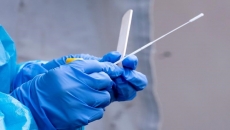>When a southwestern Ontario public health unit declared a COVID-19 community outbreak this weekend after five students in the area tested positive, some on social media scoffed at the seemingly low number.
Can five cases really constitute an outbreak, they wondered? And if not, how many cases do you need for that classification?
The labelling of an outbreak, including the one declared by the London-Middlesex Health Unit on Sunday following the positive tests from Western University students, isn't clear cut, infectious disease experts say.
And the size of an outbreak isn't always the most important factor in considering whether to call it that.
"What (an outbreak) means is that there is some kind of uncontrolled, undesired transmission of infection," said Dr. Andrew Morris, a professor of medicine at the University of Toronto. "And what we want people to understand is that whether it's in a community or in an institution like a school or hospital where there's a high concentration of people, we are concerned with outbreaks because the consequences if we fail to act can be very large.
"Five cases can very quickly move to 25 cases, (which) can very quickly move to 625 cases."
Declaring an outbreak, Morris says, signifies that something needs to be done to stop transmission quickly.
While most outbreaks will consist of two or more positive cases, the prevalence of the virus already in a community impacts how cases are classified.
So even one single positive test can be labelled an outbreak in a setting where you wouldn't expect a COVID case, such as in a small, insular community.
That's also what happened last month at a Langley, B.C., hospital where an outbreak was called following one positive case there. Since hospitals are strict with their transmission prevention protocols, Morris says it's actually unexpected that a patient would come in without COVID and contract the virus within the hospital's walls.
"When public health officials make that call (to classify an outbreak) they will look at: what they should expect to be seeing; what they anticipate they will see; and what is the potential for ongoing exposure," Morris said. "So a very small town ... that's going to be very different from Toronto.
"Outbreaks are not called every time somebody gets a new infection in Toronto, but (it is) when we see it focused epidemiologically to an institution or in a community."
Dr. Saverio Stranges, an infectious disease expert at Western, agrees that relatively small case numbers popping up at the same time in one location can be classified as outbreaks — as long as those cases can be linked to each other.
If it's likely the infections originated from one source — either a person or an event — then it's an outbreak.
"If you have cases within a (community) that have no epidemiological link, we usually define that as a cluster, not an outbreak," Stranges said.
While the terms are sometimes used interchangeably, Morris says it's important to make the distinction between cluster and outbreak.
But it's not always easy to determine which is which, he added.
He says phylogenetics, a practice used extensively in New Zealand but minimally so far in Canada, can help make that distinction by looking at the genetic strands of the virus among clusters of positive tests.
Strands of SARS-CoV-2 that are similar can be thought to have come from the same source, Morris explained. If mutations appear that are different, however, that likely means the cases are unrelated.
"When we have substantial reasons to believe that cases are related and there's a potential for growth, then it gets called an outbreak," Morris said.
The Western University outbreak could have the potential to become more troublesome than the five cases already reported. The health unit said the students, who are now in isolation, live off-campus and had not been to classes or events on the university grounds. But they had gone to restaurants and bars in London's downtown core before testing positive.
Stranges said it's hard to predict how many additional cases could arise, though.
This is where contact tracing becomes increasingly important, he added, in testing people who may have been exposed to the five positive tests.
"We know that SARS-CoV-2 is highly contagious. ... But it also depends on the mobility patterns and the kind of precautions that these students may have taken," he said. "We don't know the intensity of their social interactions. We don't know if they were wearing masks, if they were keeping distance, and so on.
"So it's very difficult to predict how many other people may be infected."





